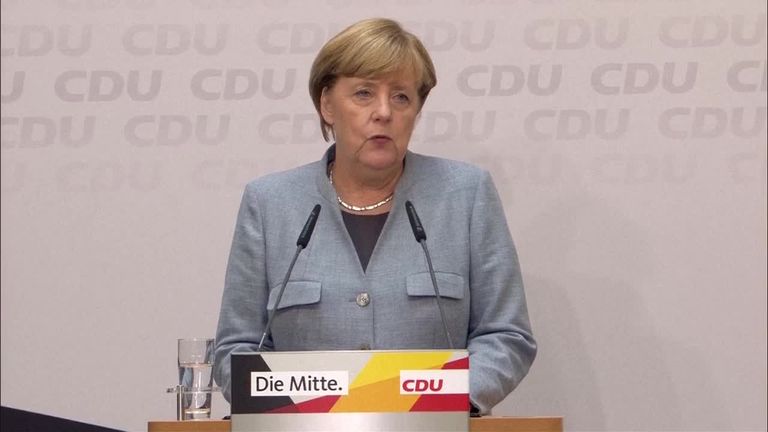What next for Angela Merkel after German government talks collapse?
The inability of Europe's longest-serving leader to build a working coalition is bad news for Brexit talks and the EU's stability.
Monday 20 November 2017 20:00, UK
It was past midnight when the German Chancellor emerged from the talks. Looking exhausted and grim-faced, Angela Merkel announced that they had failed.
"It is a day of deep reflection on how to go forward in Germany," she said.
"As Chancellor, I will do everything to ensure that this country is well managed in the difficult weeks to come," she added, her trademark calm demeanour being tested to its limit.
:: What went wrong?
From the moment the election results came in almost exactly two months ago, it was clear that the coalition she would try to form would be a very uncomfortable alliance.
Mrs Merkel's monopoly on power had been dented with voters turning further to the right and to the left.
Europe's polarised, fractured politics had come to Germany, once a symbol of political consensus.
The centre-left SPD party immediately refused to form a "grand coalition" with Mrs Merkel. Their own September electoral hammering was the consequence of the grand coalition which had diluted their distinctiveness over the past four years.
And so a "Jamaica coalition" (so-called because of the political colours of the parties involved) was the only viable option - except it's proving now not to be all that viable at all.
Mrs Merkel's CDU and its sister party, Bavaria's CSU, are not good bedfellows with their would-be coalition partners, the pro-business Free Democrats (FDP) and the Green Party.
The parties have fundamentally different views on the economy and on migration.
In the end, it was FDP leader Christian Lindner who walked out, blaming a lack of "a common vision for the modernisation of the country... no common basis of trust".
Mrs Merkel's CDU colleagues quickly denounced the FDP as a "bunch of irresponsible narcissists".
:: So what now?
Mrs Merkel informed the German President Frank-Walter Steinmeier of the failure at a meeting she'd tried so hard to avoid.
"We are facing an unprecedented situation which has not been seen in Germany for 70 years. The political parties are now challenged more than ever. To form a government is always a difficult process of struggling and quarrelling," he said of the failure.
There are now four possible options:
:: Back to the table
If Mrs Merkel's CDU and sister party, the CSU, can present some realistic concessions, then maybe the FDP can be pulled back to the negotiating table. Maybe FDP leader Mr Lindner is playing high stakes political poker, but his tone last night sounded pretty final.
:: Another grand coalition with the SPD
This had been floated as a possible solution, but SDP leader Martin Schulz appears to have ruled it out.
His centre-left Social Democrats were hammered in September precisely because they were part of the last grand coalition over the past four years.
Conscious that an alliance with Mrs Merkel striped them of their own distinctness, they've been clear that they won't repeat the alliance again. The SPD feel much more comfortable rebuilding their support base in opposition, not government.
:: A minority government
In post-war Germany, there has never been a minority government. The concept is untested and unsuited to the country's political mechanics. It would dramatically weaken Mrs Merkel's standing at home and across the European Union.
It's why she said she'd rather the final option than a minority government.
:: A snap election
The most drastic option is also very riAG百家乐在线官网.
If a new election was to be called - and it would involve a complicated political process in order to trigger the election - it is likely that the far-right Alternative For Germany (AfD) party would benefit. They did well in the September poll and would probably build on that success in another election.
There's also the likelihood that a second election would produce broadly the same fractured politics which has precipitated the current mess. But it could be the only option available.
:: What does it mean for Brexit?
For Mrs May and Brexit, this German political uncertainty is bad news. May needs Merkel's focus to break the Brexit deadlock. She hasn't had it for the past two months and she certainly doesn't have it now.
How many times has Brexit Secretary David Davis said that "things will move more quickly once the German election is out of the way"? Plenty. He was wrong.
It now seems impossible that Germany will have a government in place for the December European Council summit at which EU leaders will judge whether "sufficient progress" has been made in the divorce proceedings to allow discussion of the future relationship.
"It's obviously a problem for Brexit because does Merkel have a mandate to follow up whatever Mr Barnier (the EU Brexit negotiator) decides? It could be possible for the German parliament to give her a narrow mandate but it creates more uncertainty on how Europe will decide regarding Brexit," Frankfurt based economist Carsten Brzeski told me.
The only certainty is that German's role as a beacon of political stability in Europe is over. Whatever government finally emerges from this uncertainty, it will be significantly weaker than the last.
Mrs Merkel is Europe's longest serving leader. But she doesn't have a government to lead right now. It could be many more months before she does, and there's now genuine doubt over how long she can last.







